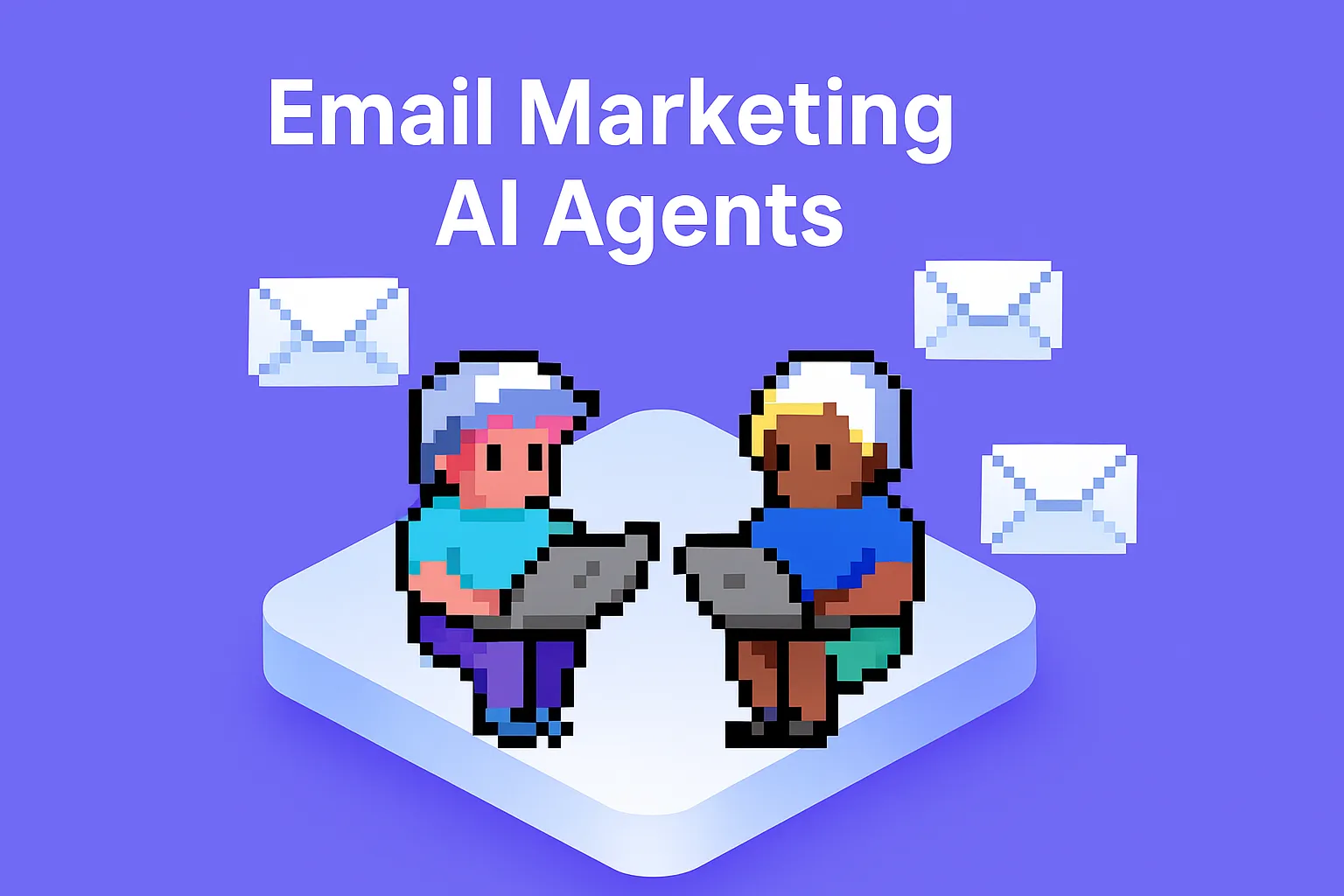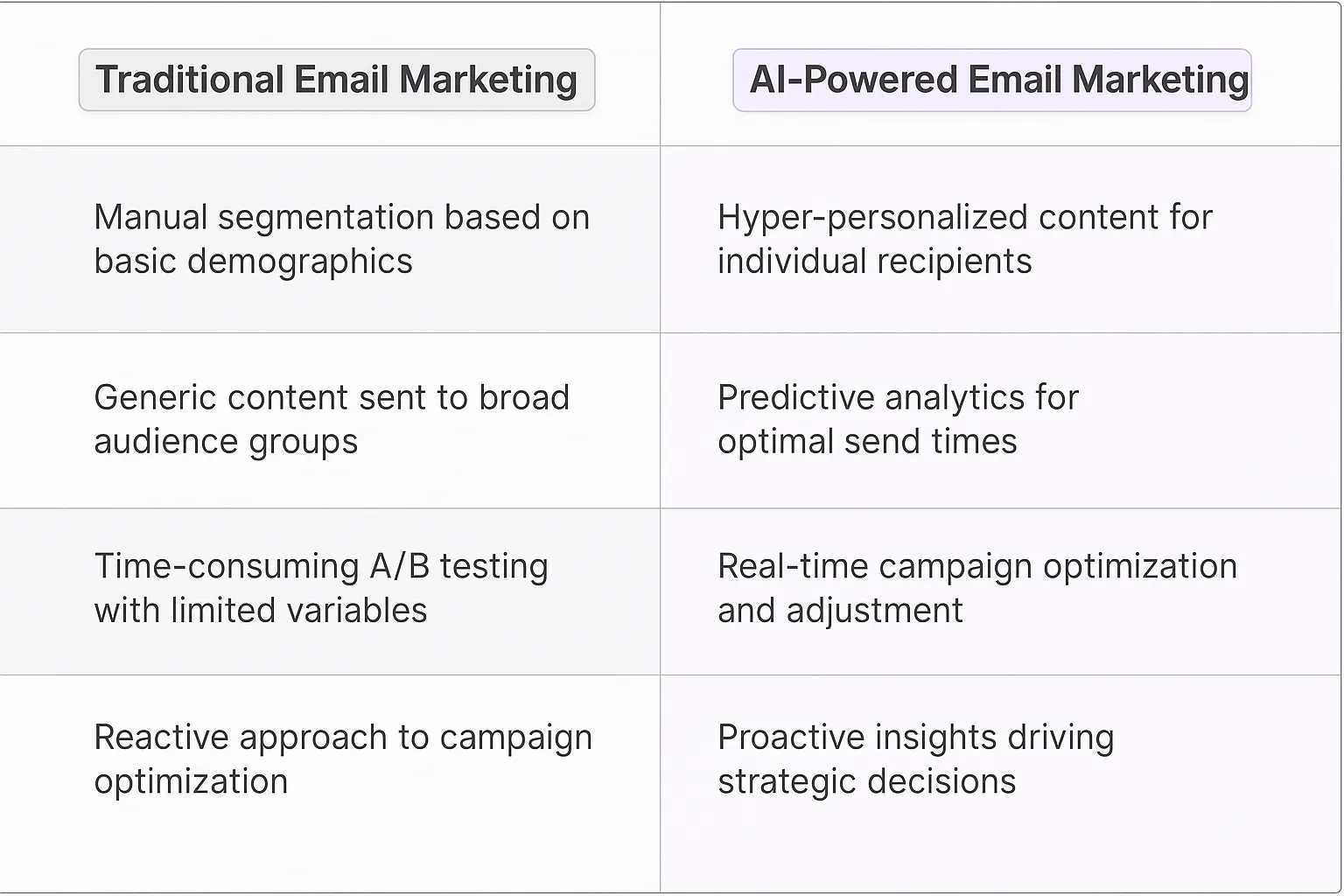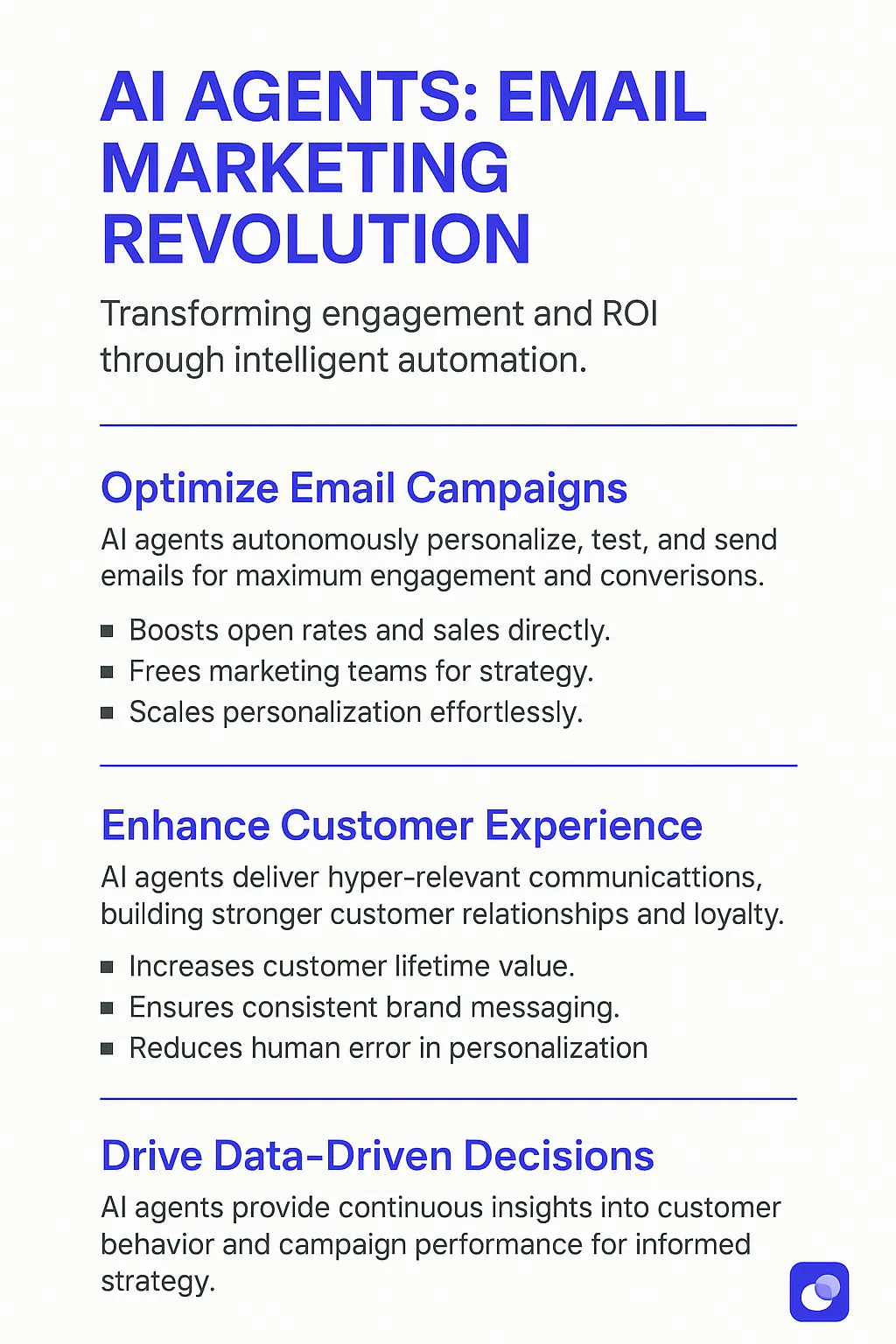Email Marketing AI Agents
The Evolution of Email Marketing with AI Agents
What is Email Marketing?
Email marketing is a digital strategy that involves sending targeted messages to a group of recipients via email. It's a direct communication channel that allows businesses to nurture leads, engage customers, and drive conversions. In the past, email marketing relied heavily on manual processes and broad segmentation. Now, with the integration of AI agents, it's becoming a highly sophisticated, data-driven practice that delivers personalized experiences at scale.
Key Features of Email Marketing
Modern email marketing, powered by AI agents, offers several key features:1. Hyper-personalization: Tailoring content to individual preferences and behaviors.2. Predictive analytics: Forecasting user actions and optimizing campaigns accordingly.3. Dynamic content: Real-time adjustments based on user interactions and external factors.4. Automated A/B testing: Continuous optimization of subject lines, content, and send times.5. Intelligent segmentation: Creating micro-segments based on complex behavioral patterns.6. Natural language generation: Crafting human-like copy that resonates with recipients.7. Cross-channel integration: Syncing email campaigns with other marketing touchpoints.
These features enable marketers to create highly targeted campaigns that leverage customer segmentation to deliver the right message to the right person at the right time.

Benefits of AI Agents for Email Marketing
What would have been used before AI Agents?
Before AI agents entered the email marketing scene, marketers were stuck in a world of manual segmentation, A/B testing, and content creation. They'd spend hours poring over spreadsheets, trying to decipher customer behavior patterns and craft the perfect subject lines. It was like trying to solve a Rubik's Cube blindfolded – possible, but incredibly time-consuming and often frustrating.
Traditional email marketing tools offered some automation, sure. But they were about as sophisticated as a flip phone in the age of smartphones. You could schedule sends and maybe personalize a name field, but that was pretty much it. The real heavy lifting – understanding customer preferences, optimizing send times, and creating compelling content – still fell squarely on human shoulders.
What are the benefits of AI Agents?
Enter AI agents for email marketing. These digital teammates are like having a team of data scientists, copywriters, and behavioral psychologists working 24/7 to optimize your campaigns. They're not just tools; they're collaborators that learn and adapt in real-time.
First off, AI agents bring predictive analytics to the table. They're constantly crunching numbers, analyzing past campaign performance, and factoring in real-time engagement data. This means they can predict with scary accuracy which subscribers are most likely to open, click, or convert. It's like having a crystal ball for your email list.
But the real game-changer is in content creation and optimization. AI agents can generate subject lines, body copy, and even design elements that are tailored to individual subscribers' preferences. They're not just pulling from a template library – they're creating unique, personalized content for each recipient. It's like having a thousand copywriters working in parallel, each one focused on a single subscriber.
The optimization doesn't stop at send time either. AI agents continuously monitor engagement metrics and adjust strategies on the fly. If a particular subject line is underperforming, they'll pivot in real-time. If certain content resonates with a subset of your audience, they'll double down on that approach for similar subscribers.
Perhaps most importantly, AI agents free up marketers to focus on high-level strategy and creativity. Instead of getting bogged down in the minutiae of list management and A/B testing, marketers can spend their time dreaming up innovative campaigns and fostering genuine connections with their audience.
In essence, AI agents are turning email marketing from a blunt instrument into a precision tool. They're enabling a level of personalization and optimization that was previously impossible at scale. And they're doing it in a way that amplifies, rather than replaces, human creativity and strategic thinking.

Potential Use Cases of AI Agents with Email Marketing
Processes
Email marketing AI agents are game-changers for businesses looking to level up their customer engagement. These digital teammates can transform how we approach email campaigns, making them more targeted, personalized, and effective.
One key process where AI shines is audience segmentation. Instead of broad-brush categorizations, AI can dive deep into customer data, identifying nuanced segments based on behavior patterns, purchase history, and engagement metrics. This granular approach allows for hyper-targeted campaigns that speak directly to each subscriber's interests and needs.
Another critical process is A/B testing. AI agents can continuously run and analyze multivariate tests, not just on subject lines, but on content, send times, and even email designs. They can quickly identify winning combinations and automatically implement them, leading to constant improvement in email performance.
Tasks
When it comes to specific tasks, AI agents are like having a team of expert marketers working 24/7. They can craft compelling subject lines that are tailored to individual recipients, increasing open rates significantly. Gone are the days of generic "Hey [First Name]" openings - AI can generate personalized intros that feel genuinely human and relevant.
Content creation is another area where AI excels. These digital teammates can generate entire email bodies, product descriptions, and even promotional offers based on user preferences and past interactions. They can also optimize content for different devices and email clients, ensuring a seamless experience for all recipients.
Perhaps most impressively, AI agents can handle real-time email personalization. As a subscriber opens an email, the AI can instantly customize the content based on their current location, recent browsing history, or even the weather in their area. This level of dynamic personalization was once a pipe dream but is now becoming a reality.
Lastly, AI can take on the task of send time optimization. By analyzing each subscriber's past engagement patterns, AI can determine the optimal time to send emails on an individual basis. This means your emails are more likely to be seen and acted upon, rather than lost in a cluttered inbox.
The potential of AI in email marketing is vast and largely untapped. As these technologies continue to evolve, we're likely to see even more innovative use cases emerge, pushing the boundaries of what's possible in digital marketing. The businesses that embrace these AI-powered tools early will have a significant advantage in capturing and retaining customer attention in an increasingly noisy digital landscape.

Industry Use Cases: Email Marketing AI Agents in Action
Email marketing AI agents are reshaping how businesses connect with their audiences across sectors. These digital teammates aren't just fancy autoresponders; they're sophisticated tools that can parse complex data, predict user behavior, and craft messages that resonate on a personal level. Let's dive into some real-world applications that show how these AI agents are transforming email campaigns from blunt instruments into precision-guided missiles of engagement.
From e-commerce to SaaS, from media to finance, AI agents are becoming the secret weapon in the email marketing arsenal. They're not replacing human creativity but amplifying it, allowing marketers to scale personalization in ways that were previously unimaginable. As we explore these use cases, you'll see how AI is not just optimizing existing processes but opening up entirely new possibilities for customer interaction and revenue generation.
E-commerce: Personalized Email Campaigns at Scale
Let's talk about how email marketing AI agents are reshaping the e-commerce landscape. These digital teammates are not just sending emails; they're crafting personalized experiences that feel like they're coming from your coolest friend who always knows what you need.
Take an online fashion retailer. They're sitting on a goldmine of data - past purchases, browsing history, wishlists. But turning that into actionable, personalized emails? That's where most hit a wall. Enter the email marketing AI agent.
This AI doesn't just segment customers; it creates micro-segments. It's like having a million tiny focus groups, each with its own tailored campaign. The AI analyzes purchase patterns, identifies style preferences, and even factors in seasonal trends. Then it gets to work.
For the customer who browses high-end sneakers but never pulls the trigger? The AI crafts an email showcasing limited edition drops, maybe throwing in some social proof from influencers. For the frequent buyer of sustainable brands? It curates a selection of eco-friendly new arrivals, complete with impact stats that resonate with their values.
But here's where it gets really interesting. These AI agents are learning machines. They're constantly refining their approach based on open rates, click-throughs, and conversions. They're figuring out the perfect time to send emails, the subject lines that grab attention, and the content that drives action.
The result? Emails that feel less like marketing blasts and more like personal shopping assistants. We're talking about conversion rates that make CMOs do a double-take and customer engagement that builds brand loyalty in ways traditional email marketing could only dream of.
This isn't just about selling more stuff. It's about creating a digital experience that's so tuned into customer preferences, it feels almost prescient. And in the cutthroat world of e-commerce, that kind of customer segmentation and personalized campaigns at scale? That's the difference between being a blip and being a brand that customers open their wallets for, again and again.
Travel Industry: AI-Driven Wanderlust Activation
The travel industry is ripe for disruption, and email marketing AI agents are the secret weapon smart companies are deploying to capture the hearts (and wallets) of wanderlusters everywhere. This isn't your grandma's travel agency newsletter – we're talking about AI that turns idle daydreams into booked flights.
Consider a major online travel platform. They've got users browsing destinations, saving itineraries, and abandoning carts faster than you can say "bon voyage." Traditional email marketing might blast out generic deals, but AI agents are playing 4D chess with user intent.
These digital teammates are parsing through a treasure trove of data: search history, booking patterns, even weather preferences. They're not just segmenting users; they're creating psychographic profiles that would make a behavioral economist swoon.
For the adventure seeker who's been eyeing Patagonia hikes? The AI crafts an email that's part National Geographic, part irresistible offer. It might showcase user-generated content from recent travelers, weave in limited-time deals on gear, and even highlight carbon offset options for the eco-conscious explorer.
But here's where it gets next-level: these AI agents are tapping into the psychology of travel. They're timing emails to hit inboxes when wanderlust peaks – think Monday afternoon slumps or the dead of winter. They're A/B testing subject lines that trigger FOMO and body copy that paints vivid, sensory-rich pictures of destinations.
The real magic happens in the follow-through. These AIs don't just send one-off emails; they orchestrate entire customer journeys. If a user bites on that Patagonia email but doesn't book, the AI might follow up with a curated list of "hidden gems" in the region, or testimonials from solo travelers who took the plunge.
We're seeing open rates that make traditional travel marketing look like it's stuck in the Stone Age. But more importantly, we're seeing higher booking rates, increased average trip values, and the holy grail – customer loyalty in an industry notorious for price-shopping.
This isn't just about filling airplane seats or hotel rooms. It's about using AI to tap into the deeply human desire for exploration and new experiences. In a world where every travel company is shouting about the best deals, these AI-driven emails are whispering personalized adventures directly into eager ears. And in the cut-throat world of travel, that whisper might just be the loudest voice of all.
Considerations
Technical Challenges
Implementing an Email Marketing AI Agent isn't just about plugging in some fancy algorithm and watching the magic happen. It's a complex dance of data, integration, and constant refinement.
First off, data quality is the lifeblood of any AI system. Your agent is only as good as the data it's fed. If your customer data is fragmented, outdated, or just plain wrong, your AI is going to spit out garbage results. It's the classic "garbage in, garbage out" scenario, but now it's on steroids (oops, I mean, it's amplified significantly).
Then there's the integration headache. Your AI agent needs to play nice with your existing tech stack. CRM systems, marketing automation platforms, analytics tools - they all need to communicate seamlessly. It's like trying to get a group of toddlers to cooperate; possible, but requires patience and a lot of trial and error.
Let's not forget about the ever-evolving nature of AI models. What works today might be obsolete tomorrow. Keeping your AI agent up-to-date means constant learning, tweaking, and sometimes complete overhauls. It's a never-ending game of catch-up with the latest advancements in natural language processing and machine learning.
The challenge of data integration becomes even more complex when dealing with multiple data sources and formats. Additionally, implementing effective workflow automation requires careful planning and testing to ensure seamless operation.
Operational Challenges
On the operational side, things get even trickier. You're essentially introducing a new team member that speaks in code and learns at superhuman speed. Your human team needs to adapt, and that's not always smooth sailing.
Training your team to work alongside an AI agent is crucial. They need to understand its capabilities, limitations, and how to interpret its outputs. It's not just about using a new tool; it's about developing a new workflow and mindset. Some team members might resist, fearing the AI will replace them. Others might over-rely on it, treating it as an infallible oracle.
Then there's the ethical minefield. AI-driven email marketing raises questions about privacy, data usage, and the line between personalization and intrusion. How much should your AI know about your customers? How do you ensure it's not crossing ethical boundaries in its pursuit of engagement? These aren't just philosophical questions; they have real-world implications for your brand and customer trust.
Measuring ROI is another beast. Sure, you can track open rates and click-throughs, but how do you quantify the long-term impact of AI-driven personalization? How do you separate the AI's contribution from other factors? It's like trying to measure the butterfly effect - possible in theory, but devilishly complex in practice.
Lastly, there's the challenge of maintaining the human touch. Email marketing, at its core, is about connecting with people. An AI agent can optimize subject lines and segment audiences with uncanny precision, but it can't replicate genuine human creativity and empathy. Finding the right balance between AI efficiency and human authenticity is an ongoing challenge that requires constant attention and adjustment.
The Future of Email Marketing: AI Agents as Powerful Allies
Email marketing AI agents are not just a trend; they're reshaping the entire landscape of digital communication. By harnessing the power of machine learning and predictive analytics, these digital teammates are enabling marketers to create deeply personalized, highly effective campaigns at a scale previously unimaginable. They're turning the art of email marketing into a science, without losing the creative spark that makes great marketing resonate.
However, implementing these AI agents comes with its own set of challenges. From technical hurdles like data integration to operational concerns about team adaptation and maintaining the human touch, businesses must navigate carefully. The key is to view AI agents not as replacements for human marketers, but as powerful tools that amplify human creativity and strategic thinking.
As we look to the future, it's clear that AI-driven email marketing will continue to evolve, offering even more sophisticated capabilities. The businesses that can successfully integrate these technologies, balancing automation with authenticity, will be the ones that cut through the noise and forge meaningful connections with their audience. In the end, that's what great marketing has always been about – and AI agents are proving to be invaluable allies in achieving that goal.
The evolution of digital communication through AI will continue to transform how we connect with customers, making every interaction more meaningful and effective.













